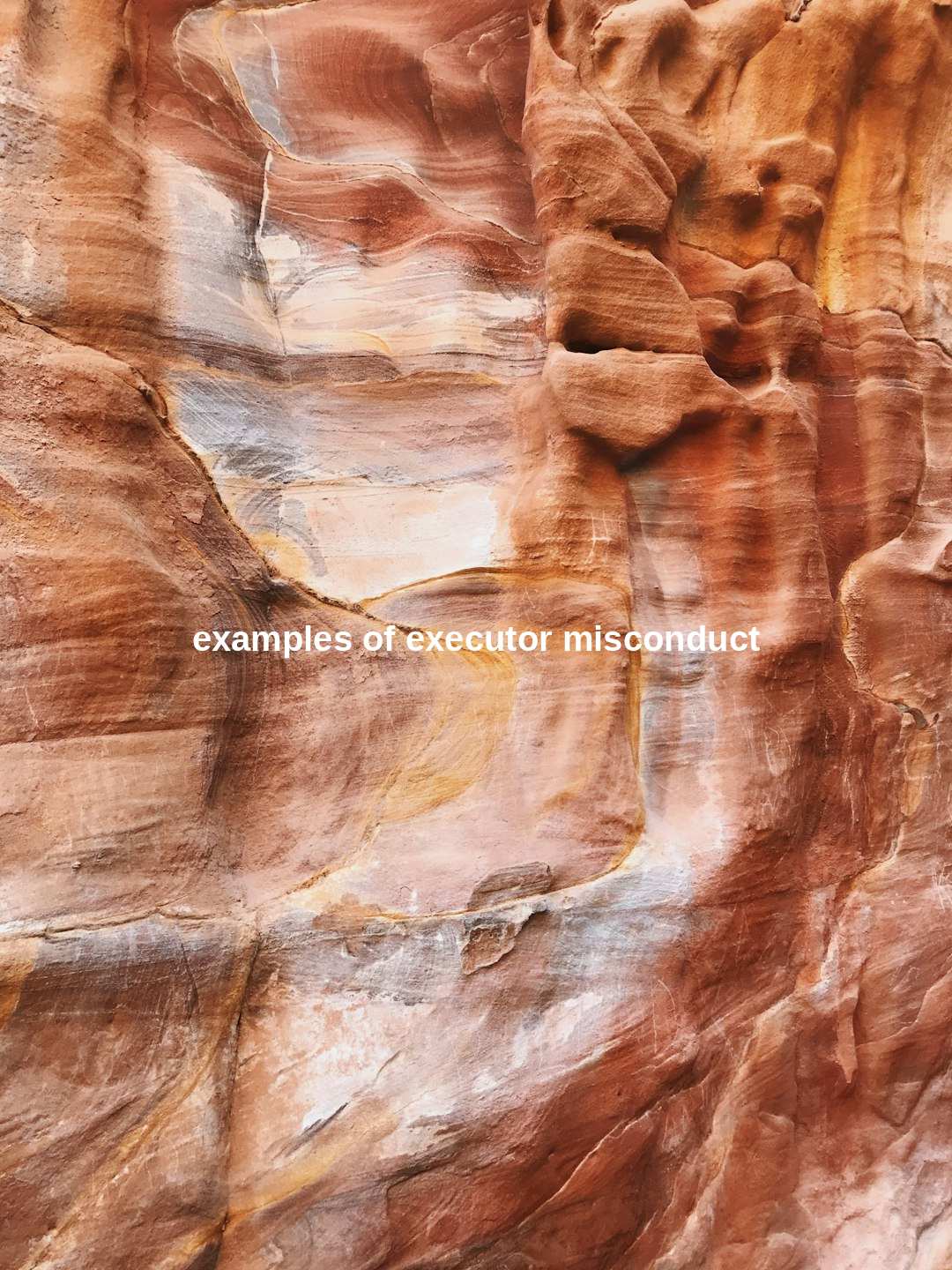When a person passes away, their estate is managed and distributed according to their will by an individual known as an executor. This role comes with significant responsibilities and requires a high degree of trustworthiness. Unfortunately, the probate process can be vulnerable to misconduct by an executor, which can lead to serious legal and personal consequences. Understanding examples of executor misconduct is crucial for beneficiaries and interested parties to ensure that the estate is being managed in accordance with the decedent’s wishes and the law. This article will delve into the various aspects of executor misconduct, providing key insights into the manner in which such behavior may manifest and the steps that can be taken to address it.
| Type of Misconduct | Description | Impact on Estate | Legal Consequences for Executor |
|---|---|---|---|
| Embezzlement of Funds | Unauthorized use or theft of estate assets for personal gain | Financial losses, reduced inheritance | Criminal charges, restitution, removal as executor |
| Failure to Distribute Assets | Withholding rightful inheritance from beneficiaries | Delay in asset allocation, beneficiaries deprived of assets | Civil lawsuits, removal as executor |
| Favoritism or Partiality | Unequal treatment of beneficiaries, favoring certain parties | Resentment among beneficiaries, disputes | Civil litigation, removal as executor |
| Failure to Account | Not providing a detailed report of estate transactions and status | Lack of transparency, potential mismanagement | Order to account, possible removal as executor |
Understanding Executor Misconduct: Definitions and Consequences
Defining Executor Misconduct
Executor misconduct refers to actions taken by the executor of an estate that are unlawful, unethical, or in violation of their fiduciary duty. This role requires the executor to act in the best interests of the estate and its beneficiaries, adhering strictly to the terms outlined in the deceased’s will and in accordance with state probate laws. Misconduct can range from breaches of duty due to negligence to deliberate fraud and theft.
The consequences of executor misconduct are severe and carry both civil and criminal implications. From a civil perspective, executors may face lawsuits from beneficiaries or interested parties, which can demand restitution and/or their removal from the role. On the criminal side, if an executor is found guilty of committing fraudulent activities or theft, they may face significant fines, restitution, and possibly imprisonment depending on the severity of the misconduct.
Beneficiaries and other interested parties must be vigilant and aware of the signs of executor misconduct to protect their rights and the integrity of the estate. In the next section, we discuss common types of misconduct by executors to further this understanding.
Identifying Common Types of Misconduct by Executors

The key to safeguarding an estate’s integrity is recognizing the various forms of misconduct executors might commit, which range from financial misdeeds to neglecting their administrative duties.
Financial Misappropriation
One of the most egregious examples of executor misconduct is the misappropriation of estate funds. This takes place when an executor uses assets for their own benefit rather than following the will’s directives. Examples include stealing cash from the estate, using estate funds to pay for personal expenses, or improperly selling estate assets and keeping the proceeds.
Neglect and Delay
Executors are also tasked with the prompt and efficient administration of the estate. Misconduct can occur when they unjustifiably fail to perform required actions, leading to unnecessary delays in asset distribution or estate closure. This may arise from either a lack of understanding of their responsibilities or a willful neglect of their duties.
Conflict of Interest and Self-Dealing
Sometimes executors may be caught in a conflict of interest where their personal interests interfere with their duties to the estate. An example is when an executor has business dealings that affect estate assets. Such a scenario often leads to decisions that benefit the executor at the expense of the beneficiaries.
The Rights of Beneficiaries: Legal Recourse and Protection Measures
Beneficiaries must be aware of their rights and the legal actions they can take to challenge executor misconduct, ensuring that justice prevails in the protection of the deceased’s wishes.
Beneficiary Rights
Beneficiaries have the right to expect that the executor will manage the estate with honesty and integrity. If they suspect misconduct, beneficiaries are entitled to review estate accounting, ask the court for an executor’s removal, or sue for damages resulting from the executor’s actions.
Legal Recourse
Should beneficiaries gather credible evidence of misconduct, they can pursue legal action against the executor. This could result in the executor being compelled to return stolen funds, being replaced by a more suitable party, or, in extreme cases, facing criminal charges.
Protective Measures
Beneficiaries have several protective measures at their disposal. They can request regular accounting from the executor, petition for court supervision of the probate process, or request the appointment of a neutral third party to oversee the executor’s duties.
Preventing Misconduct: Duties and Oversight of an Executor
Implementing strict duties and providing proper oversight are essential strategies to prevent executors from abusing their power and committing misconduct.
Executor’s Duties
An executor must adhere to a high standard of conduct, which includes dutifully cataloging all assets, paying off debts and taxes, and distributing the remaining assets according to the will. They must also provide accurate accounting and keep transparent records.
Oversight Mechanisms
Oversight mechanisms such as court supervision and regular accounting can serve as significant deterrents to misbehavior. These practices ensure that executors fulfill their responsibilities while providing beneficiaries with peace of mind.
Preventative Best Practices
Educating executors about their roles and the importance of their duties helps to prevent misconduct. It’s also wise to choose executors with a proven record of honesty and integrity. If an estate is particularly complex, appointing a professional executor like a trust company may be advisable to minimize the risk of misconduct.
Conclusion: Safeguarding the Probate Process Against Executor Misconduct
In closing, the role of an executor is one of great responsibility, calling for the utmost in honesty, prudence, and dedication to the deceased’s intentions. The probate process is designed to honor the final wishes of an individual, but it is not immune to the risk of misconduct. By understanding the types of wrongdoing an executor might engage in, recognizing the rights afforded to beneficiaries, and enforcing the duties and oversight required, we can significantly reduce the incidence of such improprieties. The importance of these protective measures cannot be overstated as they ensure both the executor’s accountability and the beneficiaries’ receipt of their rightful inheritance. It is essential for all parties involved to remain vigilant and responsive to any signs of malfeasance to maintain the integrity of the probate process.
- Executors must act in good faith, adhering to the will and legal requirements, to avoid committing misconduct.
- Common types of executor misconduct include embezzlement of funds, failure to distribute assets, favoritism, and failure to account.
- Beneficiaries have rights that must be respected by the executor, including the right to information and fair treatment.
- Legal recourse for beneficiaries includes demanding an accounting, petitioning for removal of the executor, and suing for damages or misconduct.
- To prevent misconduct, executors should be thoroughly informed of their duties, and beneficiaries should advocate for transparency and accountability.
- Oversight mechanisms such as court supervision and beneficiary involvement can deter misconduct and lead to a more equitable probate process.


